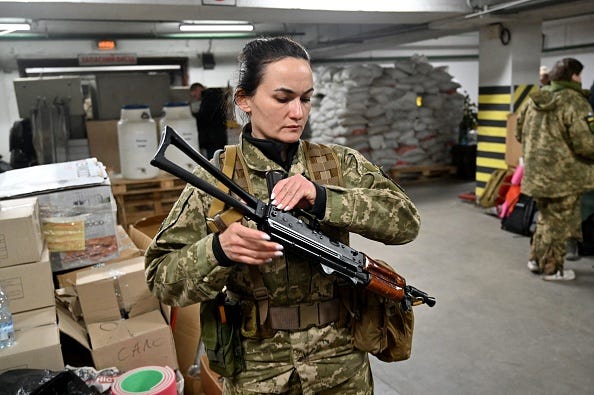Erica Chenoweth & Zoe Marks: Women Power Civil Resistance Movements, Including in Ukraine.
That's Why Autocrats Fear Them
I'm pleased to bring you this interview with Erica Chenoweth and Zoe Marks, the authors of an recent Foreign Affairs article, "Revenge of the Patriarchs: Why Autocrats Fear Women."
Erica Chenoweth is the Frank Stanton Professor of the First Amendment at Harvard Kennedy School and a Susan S. and Kenneth L. Wallach Professor at the Radcliffe Institute for Advanced Studies at Harvard University. They study political violence and its alternatives.
At Harvard, Chenoweth directs the Nonviolent Action Lab, an innovation hub that provides empirical evidence in support of movement-led political transformation. Their most recent book is Civil Resistance: What Everyone Needs to Know (Oxford, 2021). Chenoweth maintains the NAVCO Data Project, one of the world’s leading datasets on historical and contemporary mass mobilizations around the globe.
Zoe Marks is a Lecturer in Public Policy at the Harvard Kennedy School. Her research and teaching interests focus on the intersections of conflict and political violence; race, gender and inequality; peacebuilding; and African politics.
Her current book project examines the internal dynamics of rebellion in Sierra Leone. She has previously worked for UN and non-governmental organizations in Ethiopia, France, Sierra Leone, South Africa, the UK, and the US.
She and Erica Chenoweth have a forthcoming book with Princeton University Press, Rebel XX: Women on the Frontlines of Revolution. Our conversation, which took place on March 10, 2022, has been edited for clarity and flow.
_________________
Ruth Ben-Ghiat (RBG): Your recent Foreign Affairs article argues that we need to take misogyny seriously as a contributing factor to the advent and durability of authoritarianism. Why do you think that gender analysis has been left out so often from sweeping analyses of authoritarianism? We have so many studies about the appeal of illiberal politics for women in specific contexts, and about the price women pay under illiberal states.
Zoe Marks (ZM): I started in conflict research and there's been a bit of a renaissance or resurgence of attention to gender. And when I turned to what seemed like bigger, more central topics, like authoritarianism and democracy, I just assumed that there would be exponentially more gender-related research. And it's quite the contrary. There is less interest in how masculinity is manifesting in politics or why the overrepresentation of men matters.
Erica Chenoweth (EC): The first time the relationship [of autocracy and gender] really clicked for me was when Zoe and I were having a conversation, and she said that it's telling that people talk about how women are underrepresented rather than how men are overrepresented. And if you just switch that simple framing, it becomes much more obvious that we've just simply been conditioned to think that it's right and normal for there to be more men. And that any time there are any women, we should feel lucky.
RBG: What drove me to include gender analysis in Strongmen is that I found that misogyny and homophobia are continuities throughout all authoritarianism regimes, whether they are regimes upholding White racial privilege or anti-White anti-colonial regimes. So, this kind of analysis is really overdue. I think that's why your article struck such a chord in people.
EC: There is a recent book, The First Political Order, by Valerie Hudson and colleagues, which looks over the course of history at the stability of patriarchy. Any time we've had major bursts of women's equality and emancipation, there's always been this patriarchal backlash. They lay out a theory for why that's the case. In Zoe's and my research, we came to this issue from a focus on how women's participation in pro-democracy resistance movements and anti-colonial movements actually affected the success of those movements and long-term trajectories toward democratization.
RBG: I wanted to talk about the role of women in civil resistance, and the prominence of women in pushback around the world against autocracy. Why are women always on the front lines?
ZC: Women are almost always there in nonviolent movements, but they're not always there in violent movements. Our project includes both violent and nonviolent mass campaigns and we see that women participate in all but one of the massive national nonviolent movements and in about 30% of the violent campaigns in terms of frontline participation.

I think that one of the reasons why women participate in such large numbers generally is because most women are motivated by ordinary politics. There's this assumption that women mobilize for women's issues, but actually women are mobilizing for general issues that affect all people, regardless of gender, especially their families or their children or their grandchildren or their parents.
ZC: The women who appear in our data set as movers and shakers of history are motivated by economic issues, corruption, whether or not human rights are being respected. They're there as political actors. So, it's not about women's movements or women's rights per se: women mobilize for things that are part of a national agenda.
RBG: Yet another marginalization of women, the idea that they are seen as mobilizing only for "women's things." I imagine you're following what's going on in Ukraine and the civil resistance there closely.
EC: Well, what I've really noticed a lot from the verified footage, at least what I've seen of marches, demonstrations, road blockades, etc., is that women are prominently on the front lines. They are capturing the world's imagination for what courage and legitimate opposition looks like.
It's playing out exactly like I think we would expect it to, in terms of the visual impact of seeing a Ukrainian woman in a puffer coat encountering combat troops from Russia, and saying, what are you doing here? Does your mom know you're here? Does your grandmother know you're here?
People might find it easy to diminish the potential political impact of that. But in fact, what we know from previous civil resistance campaigns is that they succeed when the agents of repression, the foot soldiers, as it were, refuse to carry out the orders. And they refuse to carry out the orders because there are civilians encountering them and making it really hard for them to carry out their orders.
So, there have been a high number of desertions, there's a lot of talk of low morale, and this is happening because people are meeting the invasion force with unarmed resistance and women are out front and it just creates a totally different micro-dynamic in that political environment than say, getting behind the sandbags.
ZC: Women are also mobilizing militarily to resist, and there's this dynamic between women who are taking up arms to be part of the resistance and making Molotov cocktails in the subways and grandmothers who are going out to nonviolent protests. And I think that those two things are interacting with each other. Having women who are willing to take up arms helps to motivate others who want to use non-violent methods.
Putin's response has also been shockingly cowardly, in that he's been arresting children and their mothers who are protesting, and he's bombed a maternity and child health hospital. These are not signs of strength.
I always think it's fascinating to flip the narrative on autocrats and think about why they're so freaked out by the people who they seem to think are somehow not powerful.
RBG: And it's the same person who poses with a bare chest, who has invested so much in cultivating a hypermasculine presence.
EC: Yes, and when Putin talks about the decadence of the West he links it to LGBTQ propaganda. It's an incredibly gendered threat perception and his response is to just go full masculine on it and send in almost 200,000 troops with massive guns to bomb maternity wards.
RBG: What are lessons from your research for America? It's interesting that we are not hearing too much about the Women's March of 2017, even though we're so concerned about the upcoming midterm elections. The Women's March directly affected Democratic success in the 2018 midterms by inspiring many women to become candidates and bringing a whole wave of women into power.
ZC: I've been the most preoccupied with the right's focus on families and schools. The "Don't say gay bill" and the criminalization of parents of transgender children. I think this is similar to what's happened in Hungary and Poland and Russia. It's important for us to be honest about what countries we're keeping company with on some of our political initiatives. It's the GOP's strategy for getting out women's votes. They're trying to mobilize women as mothers.
EC: I think there are two main takeaways. First, if we want our democracy to thrive, we have to make sure that women are fully represented and included at every level. Whether that's in the school boards or in community organizing spaces or state and national government spaces or the corporate sector. We need to see that women are represented.
And that doesn't mean that women need to agree on everything. One of the points that Zoe often makes is that we have made major progress in emancipation for women when women are allowed to have competing perspectives and not be there representing "the woman's point of view."
And number two, we need to see these assaults on women, on gender equality, on trans families and children, on gay people, as assaults on democracy. It's an attempt to restore a patriarchal authoritarian order. We need to just see it as such.






Thank you, Ruth for bringing this valuable perspective on political, economic and social order from these 2 women. After reading your interview I realized I previously had a limited view of womens' capabilities to make change at all levels of society, including the military. Then I remembered, how is it that women ARE at the top of the political spectrum in Finland? The happiest country in the world. Coincidence?
You folks reading my mind ? Excellent description of reality..............Manifestation of Masculinity. Underrepresentation of the Feminine. Woman's issues = all issues. Emotional confrontation = results, soldiers have Mothers. 200,000 troops to bomb a maternity ward. A patriarchal authoritarian order, IS, an assault on Democracy............ This conversation needs to be printed in a way that reaches the masses. I experience, this presentation is in the forefront, the leadership of the early beginnings, of a shift to the Feminine order of reality. I also experience, we have little time to make the shift, before ending life as we know it. We have had a documented 2500 year run at a Patriarchal world rule. It didn't and doesn't work. Presently, the world is confronted with issues, of our making, of a heightened intensity and immediate danger. We need this change that has been presented here. "The Kin of Atta are Waiting for You", was not just a feel good book. It needs to be mandatory reading. A survival guide and a warning of the results of an overabundance of testosterone. This is not rocket science. This post is reality. Many thanks to all for your vital work.